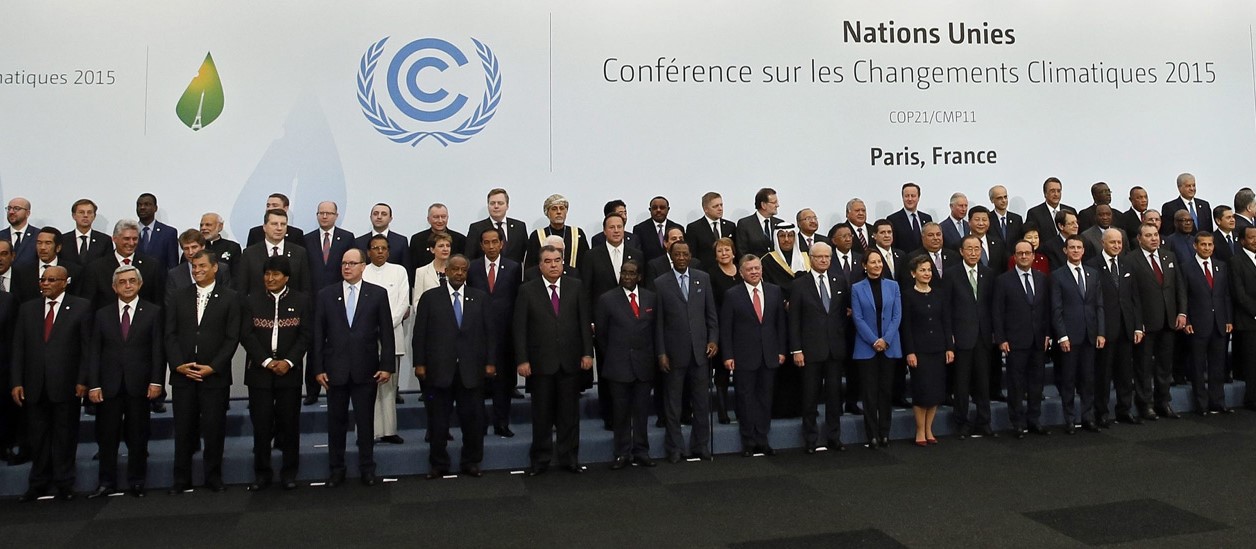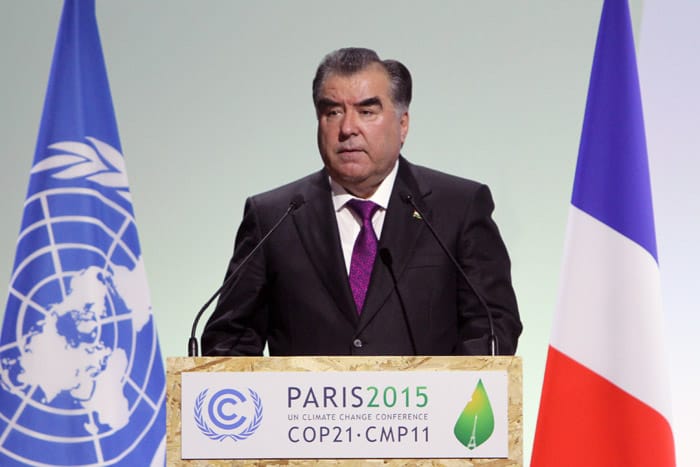Speech of the President of the Republic of Tajikistan at the 21st Conference of the Parties of the United Nations Framework Convention on Climate Change
First of all, let me express my deep gratitude to the Government of France for organizing the 21st Conference on the planetary scale problem of climate change and for the warm welcome.
Today's conference is undoubtedly a continuation of the ongoing efforts of our countries to shape the world community's approach to prevent a further increase in greenhouse emissions and to develop measures to reduce global warming and the negative consequences of climate change.
The Republic of Tajikistan, having expressed its national position in response to the UN call for the provisions of the Paris Agreement to maintain the average temperature of the planet, has actively cooperated in this process within the framework of the Durban Working Group.
Although the Republic of Tajikistan's share of global greenhouse gas emissions is negligible, it is nevertheless one of the vulnerable countries in the climate change process. Today, the main spheres of Tajikistan's economy are facing negative consequences related to climate change.
Our country, with 93 per cent of its territory made up of mountains, is one of the main sources of water resources in Central Asia. At the same time, 60 per cent of the region's water resources originate in Tajikistan's glaciers.
The intensive melting of glaciers as a result of climate change poses a serious threat to the process of ensuring favourable living conditions for the population and protecting water resources. Suffice it to note that out of 14,000 glaciers in Tajikistan, which are vitally important for the entire region, more than 1,000 small glaciers have disappeared in the last 30 years.
The process of accelerated melting of glaciers as a result of increased air temperature has led to increased natural disasters and degradation of the water ecosystem. This phenomenon annually causes destruction of national economic facilities and considerable financial losses to the country's population.
Natural disasters related to water this summer alone have caused hundreds of millions of dollars worth of damage to the population and economy of the country. Unfortunately, there were also human casualties.
The current environmental situation in the transboundary river basins may be more sensitive due to the gradual growth of the population, increasing needs for industrial development, further expansion of irrigated areas, degradation of irrigation systems, inefficient use of water resources, and insufficient capacity to prevent and mitigate the impact of natural disasters.
Tajikistan is actively cooperating with the Secretariat of the UN Framework Convention on Climate Change in the process of drafting a new agreement on climate change. Our country submitted its Third National Report to the Secretariat of the Convention back in 2014.
The Government of the Republic of Tajikistan in order to prevent the consequences of climate change and adaptation to it has taken a number of practical measures to improve legislation, public policy and implementation of recommendations of activities of the parties to the Convention and continued cooperation in this direction with its international partners.
At this stage, Tajikistan is developing a national Climate Change Adaptation Strategy, which is expected to be adopted in early 2016.
Although Tajikistan ranked 135th in terms of carbon dioxide (CO2) emissions in 2010 according to the International Energy Agency, it nevertheless pays close attention to greenhouse gas emissions in its economic development process, in particular in the implementation of economic projects.
It should be noted that Tajikistan, as a pilot country in climate change issues, effectively cooperates with international financial institutions and the Climate Investment Fund during implementation of adaptation projects.
The Republic of Tajikistan, taking into account the large volume of greenhouse gas emissions in the process of using fuel and energy sources, considers further development of renewable energy to be an effective factor in reducing emissions. Thus, our country attaches importance to effective use of renewable energy sources, especially hydropower, which contributes to socio-economic development, adaptation of population to climate change and formation of "green economy". At the same time, the construction of hydropower facilities favourably contributes to the reduction of water-related natural hazards. On this basis, the development of hydropower is among the priorities of the Government of the Republic of Tajikistan.
To this end, the Republic of Tajikistan, in cooperation with its international partners, currently continues to work on repair, modernisation and construction of hydropower plants, as well as undertakes necessary measures to develop power lines, both within the country and with regard to their connection to external power lines.
Taking into account the global importance of renewable energy use, the Republic of Tajikistan, while implementing hydropower projects using its vast water reserves, considers the establishment of transparent regional and international cooperation taking into account economic, social and environmental features of sustainable development of modern energy as an important factor in adaptation to climate change.
At the same time, for the Republic of Tajikistan, located at the source of the major transboundary rivers in the Central Asian region, the prevention of water-related disasters and the management of their consequences are important.
Given the importance of financing in the climate change process, we believe that attracting foreign investment for the development of hydropower in Tajikistan and the formation of favourable conditions for renewable energy exchange between the countries can have a positive impact on the reduction of greenhouse gas emissions in the region.
In this regard, Tajikistan is interested in the success of both the Green Climate Fund for Climate Change Assistance and the Adaptation Fund and the establishment of the necessary cooperation in this direction.
Efficient use of water resources, which are the most vulnerable to climate change, plays a major role in achieving the Sustainable Development Goals. It is safe to say that the International Decade for Action 'Water for Life', 2005-2015 has achieved some successes in this regard. The new Water for Sustainable Development Decade, initiated by Tajikistan, may provide a good opportunity for cooperation towards the sustainable use of water resources.
The decisions of this Conference and the measures taken within the framework of a new international decade can contribute to the overall objectives of climate conservation, environmental protection and sustainable development.
Thus, Tajikistan, along with other stakeholders, is already taking sustained steps to reduce and adapt to climate change stresses.
Despite this, the international community, in order to establish broad and comprehensive cooperation on greenhouse gas emission reduction and adaptation to climate change, needs an appropriate instrument recognised by all stakeholders. We supported the process of preparing such a comprehensive document.
In Tajikistan's view, this document, taking into account influencing factors, should, first of all, preserve mechanisms for limiting greenhouse gas emissions and incentives for their subsequent reduction. In this case, the regional nature of practical measures will have the most favourable effect.
Thus, establishing broad cooperation between countries and international institutions, continuing dialogue between stakeholders, developing renewable energy and implementing coordinated action on climate change are seen as effective in achieving the real objectives.
At the same time, addressing the challenges of developing national greenhouse gas emission accounting networks, improving climate research, introducing green innovations and training human resources play a major role in this process.
Implementation of practical measures related to protection of mountain ecosystems, namely to prevent degradation of water (rivers, lakes, snow and glaciers) and natural resources is of paramount importance for Tajikistan.
In this context, issues related to the use of water resources and arable land, strengthening the agricultural industry in order to ensure food security require the close attention of stakeholders. The halting of further environmental degradation in the Aral Sea Basin, including the conservation and rational use of water resources and arable land, and ensuring environmental sustainability require urgent action.
Tajikistan expresses hope that developed states, UN structures, international and regional organizations, influential international financial institutions will continue their efforts on cooperation to address important issues of adaptation to climate change and mitigation of its stresses.
Addressing the existing challenges in reducing the negative impacts of climate change in the context of global development requires us to make collective efforts and to implement urgent and long-term measures.
The Republic of Tajikistan by virtue of its financial and economic capacity, with the support of the world community will continue its efforts to achieve common goals in the field of climate change.
Thank you!


.png)
.png)









